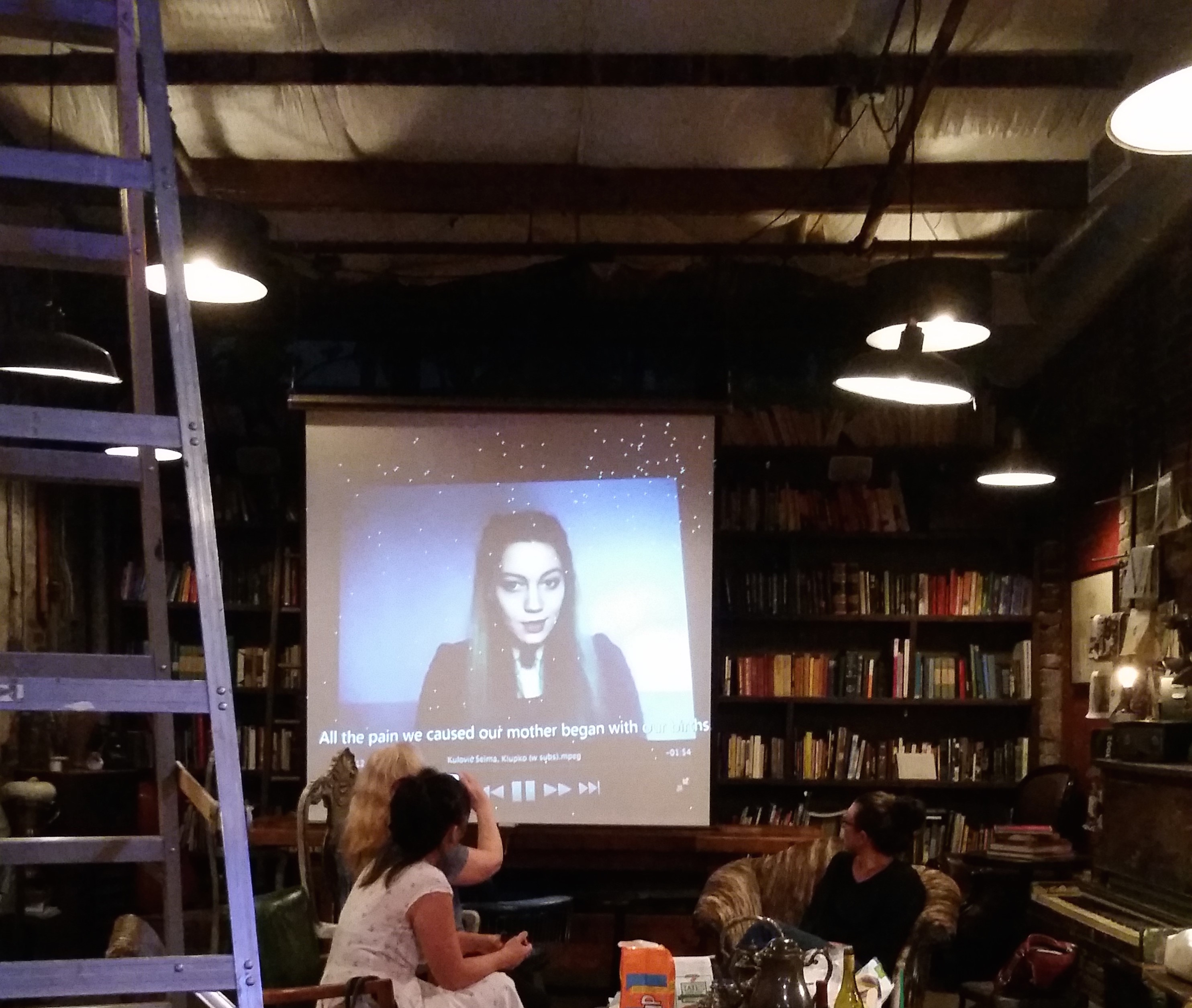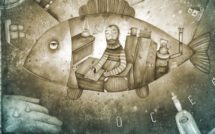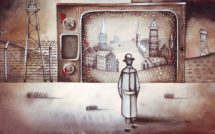
The Borders Project: Sarajevo Writers’ Workshop + Atlanta’s Narrative Collective

In the fall of 2015, as people fleeing Syria and elsewhere for Europe were being stopped en masse at borders, two writers’ collectives to which I belong – one based primarily in Sarajevo, one in Atlanta – decided to engage in a collaborative artistic response. We called it The Borders Project. At the time, thousands were walking through the Balkans. Others were trying to cross the sea. One Sarajevan suggested the title No Borders, though in the end we kept to our original theme.
I’d launched the Sarajevo Writers’ Workshop (SWW) in Bosnia and Herzegovina in 2012 with poets and prose writers of varying experience levels who are now dear as family. Initially, I’d traveled to the city on a fellowship to research a novel. Bosnian friends would ask of the book, Is it about the war? No, I’d say. They would express approval or relief. Later, the writers and I started holding workshop meetings in the café at Buybook bookstore and, then, in the green room at the Sarajevo War Theatre (SARTR), where we were occasionally joined by a seamstress making, we guessed, costumes or material for sets. Afterward, we’d go out for a beverage, usually to Galerija B. Smoje, our favorite watering hole.
A couple years later, in 2014, I was living in my hometown, Atlanta, Georgia, where I’d begun a stint as writer-in-residence at the Goat Farm Arts Center. Our Sarajevo group was meeting online in Hollywood-Squares fashion – faces in rows on a screen. A few of us were now in different countries. I would set up my laptop on a weekend morning in the Goat Farm’s coffee shop, called the Warhorse, and we would discuss our work across virtual borders.
That fall, I and my friend L.S. (Laura) McKee, an Atlanta-based poet, co-founded Narrative Collective, a writers’ group that is also like family and which is currently in residence at the Goat Farm—the Warhorse is our regular meeting spot.
Laura and I began discussing how we might connect artistically with the Sarajevo group. She sat in on one of our online poetry workshops, and as the migration crisis intensified in 2015, we refined with the others a plan for a themed collaboration.
Together our collectives make eighteen writers plus our prolific Sarajevo-based translator, Mirza Purić. Aside from Mirza, we are all women. We agreed on “borders” as our topic, deciding to use the project as a way to examine, via poetry and prose, boundary lines of all kinds – physical, emotional, relational, and generational, among others.
Our process worked like this: each week we posted pieces to an online platform. Mirza, also a contributing editor at EuropeNow, put the Bosnian/Croatian/Serbian texts into English, practically on the spot, so we would have access to the work in both languages. Then we engaged in a written discussion of the poems, stories, and essays – mainly, though not exclusively, in English. We held a few group video meetings to talk literature and share ideas (pets and one child included).
The range of work we produced astonished us – we’d covered, among other things, aging, death, illness, love, abandonment, childhood, imagination, betrayal, war, all in our effort to investigate limits that cut through our lives. Wanting to present this writing somehow, we held a public Borders Project reading in the Warhorse the following spring, thanks to the Goat Farm’s ongoing support of our work and particular enthusiasm for this collaboration. The Sarajevo workshop writers participated via video clips (subtitled in English in some instances), projected on a big screen in front of a wall of books. We would alternate between the collectives, between live readings and clips. I was mesmerized as my SWW friends’ faces came up and their voices and intonations sounded through that long room. I missed them: Weren’t we just holding workshop in SARTR talking over the hum of the seamstress’s machine?
Listening to the excerpts of our pieces read in succession, I was also able to note the overlaps in our work. Speakers in a couple of poems resist or rebuff intimates. Pieces grapple with the loss of mothers. A poem by a Bosnian personifies the nation and shares imagery – a teacup – with a poem by an Atlanta writer, exploring exile and inclusion. An essay relates its author’s encounter with a woman in a refugee camp. Other works meditate on aspects of childhood, with death or darkness around the edges. One Bosnian story dramatizes the divided world – urban and rural – of its young character; another, the divided experience of cousins, one of whom lives in diaspora.
Characters confront the brokenness of parents or live with the damage of their own dysfunction. One story considers cycles of history as played out across personal relationships; another piece discusses division in the American South. Still others explore disorientation: an Atlanta poem examines boundaries of perception as an older character loses her sight; a Bosnian poem depicts a mental health patient’s experience on a bus; another Bosnian piece features an older man perplexed by changes in his world.
Standing outside the Warhorse after the event in the warm night air, one of the Atlanta writers, Rachael Maddux, remarked how much subtext she realized she might be missing when coming to the Bosnians’ work. We were speculating, along with a friend from Eastern Bosnia who’d attended the reading, whether there might be a political reference in one of the stories. If it were there, Rachael said, she wouldn’t have caught it. Borders seem to exist even in art, she noted. Even in this project.
But what had struck me as I listened to the readings was something else – our shared humanity. Our potential for relating through empathy, whether or not we understood each other’s contexts fully. We don’t suffer in the same ways. Brokenness touches us differently. Our personal struggles vary. Political and economic situations divide. Privilege can thwart justice. Conflict wrecks and displaces. Yet, at least in some cases, voices can still cross borders, and that truth – the experience of story or art as a throughway for connection – seems still more resonant now.
In this Borders Project special feature, we will publish the work that came out of the Sarajevo-Atlanta collaboration, curating the pieces in small groups over the next several issues. The Bosnian/Croatian/Serbian texts will appear in Mirza Purić’s fine English translation. We will also be asking visual artists to provide responses to the pieces and will include their work alongside ours.
It is our hope that as you engage with these poems, stories, essays, and visuals, you, too, will be moved.
Below is a list of Borders Project participants:
Selma Asotić
Naida Avdović
Marina Alagić Bowder
Neđla Ćemanović
Nermana Česko
Dijala Hasanbegović
Melanie Jordan
Kulović Selma
Esther Lee
Rachael Maddux
Stacy Mattingly
L.S. McKee
Suzanne Mozes
Mirza Purić (translator)
Máire C. Ryan
Matea Šimić
Kate Tuttle
Daniela Valenta
Zerina Zahirović
Stacy Mattingly launched the Sarajevo Writers’ Workshop, a bilingual group of poets and prose writers in Bosnia and Herzegovina, in 2012. She later co-founded Narrative Collective in Atlanta, Georgia, with poet L.S. McKee. She has worked as a coauthor on books including, with Ashley Smith, the New York Times bestseller UNLIKELY ANGEL, an Atlanta hostage story released as a feature film, CAPTIVE. Stacy has taught creative writing at Boston University, where she received an MFA in fiction, and at GrubStreet, and she helped lead the first Narrative Witness exchange (Caracas-Sarajevo) for the University of Iowa’s International Writing Program. She has recently completed a first novel, set in the current-day Balkans.
Published on January 6, 2017.




